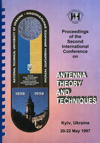Application of microwave dielectric measurements to control of industrial solutions
DOI:
https://doi.org/10.1109/ICATT.1997.1235256Abstract
Like the optical refractometry, the microwave dielectric measurements are apt to investigations of chemical reactions and other transformations, to determination of catalysis activity of ferments, of reproduction rate of micro-organisms. Such measurements are also adaptable to study a changes of substance structure during the process of phase transformations [1, 2]. The dielectrical method is usable also for the determination of concentration of different industrial solutions. The application of dielectrical method can best be done for solutions with high concentrations or with appreciable difference in the polarizability of solution ingredients.
We have studied the changes of propagation parameters of microwave electromagnetic waves on the interaction with industrial sugar solutions inserted into the special waveguide cell. The reflection coefficient and power attenuation are uniquely determined by the real and image parts of solution permittivity.
References
Lerf, C.; Suppan, P. Hydrogen bonding and dielectric effects in solvatochronic shifts. J. Chem. Soc. Faraday Trans., 1992, Vol. 88, No. 7, P. 963-983.
Rohmann, M.; Stockhausen, M. Studies of polymer solvation by dielectric relaxation spectroscopy. Part 6. J. Chem. Soc. Faraday Trans., 1992, Vol. 88, No. 11, P. 1549-1553.
Sapronov, A.R. Technology of Sugar Manufacturing. Moscow: Agropromizdat, 1986, 431 p.

